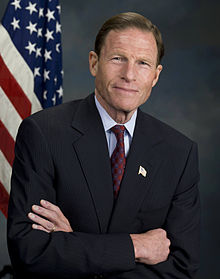My junior senator, Richard Blumenthal, took it upon himself this week to write a letter to the CEO of Hobby Lobby, David Green, asking that his company defer to Connecticut law and provide the women who work in its East Haven and Manchester stores with “the full range of contraceptives approved by the FDA”–i.e. those contraceptives that the Supreme Court just said Hobby Lobby didn’t have to provide to its women employees because of its religious scruples.
Blumenthal does acknowledge that the Hobby Lobby decision “may provide your company with legal discretion to limit health insurance coverage for a range of contraceptives in certain circumstances,” but asks that the company respect a policy established with “strong bipartisan support” and which enjoys “broad public support” in the Nutmeg State.
As if.
So what’s Blumenthal up to? Well, the letter helps highlight the fact that he’s co-sponsoring the Protect Women’s Health From Corporate Interference Act, a bill designed to require for-profit companies to cover the full range of contraceptive services under Obamacare. Not that the bill is going anywhere in the Republican-controlled House of Representatives. But as Connecticut residents are only too well aware from his 20 years as their Attorney General, Blumenthal never lets an opportunity pass to call attention to what he’s doing for them.
The problem with his letter is that it obscures the actual legal situation–and this is something that we all should understand better than we have. So here goes–and pay attention, because this is going to be on the midterm.
The Hobby Lobby decision is entirely based on the Religious Freedom Restoration Act (RFRA), under which the federal government has to show that it is furthering a “compelling state interest” by the “least restrictive means” in order to defeat a claim of violating someone’s free exercise of religion. However, RFRA does not apply to state law, which (according to the Supreme Court’s Boerne decision) merely needs to be “neutral” and of “general applicability” in order to withstand a free exercise challenge. The point here is that Hobby Lobby is irrelevant to the applicability of Connecticut’s contraception mandate. With me so far?
OK, so if RFRA doesn’t negate Connecticut’s contraception mandate, why does Blumenthal have to beg Green to go along with it? The answer is that under the Employment Retirement Income Security Act (ERISA), organizations can avoid state insurance regulations by self-insuring through the establishment of ERISA trusts. And that’s just what Hobby Lobby has done. Indeed, quite a few religious non-profits have done the same precisely in order to avoid state contraception mandates.
However, there’s a catch. In 1983, the U.S. Supreme Court held in Shaw v. Delta Air Lines that the ERISA preemption did not apply to those state laws that are consistent with and promote the goals of Title VII of the Civil Rights Act. The court didn’t want companies to use the ERISA preemption to avoid state laws ensuring employees’ civil rights. And in 2000, the Equal Employment Opportunity Commission ruled that the failure of employers to include contraceptives in comprehensive prescription drug coverage constituted sex discrimination under Title VII. That ruling was upheld the following year by a U.S. District Court in Seattle in a case called Erickson v. Bartell Drug Co.
As a result of these rulings, by 2007, 28 states had enacted contraception coverage mandates. That year, the Eighth Circuit Court of Appeals declined to follow Erickson, holding in In re Union Pacific Railroad Employment Practices Litigation that there was no violation of Title VII because the sexes were treated the same with respect to contraception benefits. Since then, no other federal appeals court (including the Supreme Court) has addressed the issue, which means that outside the Eighth Circuit (the states from Arkansas to North Dakota), all state contraception mandates except Illinois’ (which provides a religious exemption for for-profit companies) actually apply to Hobby Lobby.
Which means that Connecticut is within its rights to demand that Green provide the full range of contraceptive services to his women employees in East Haven and Manchester. And that Blumenthal shouldn’t be saying pretty please.*
*For expertise and research assistance, the author of this blog post would like to thank Tom Baker, William Maul Measey Professor of Law and Health Sciences at the University of Pennsylvania Law School; Sam Livingston, B.A. Trinity College 2014; and a health care lawyer for a large Connecticut insurance company.






